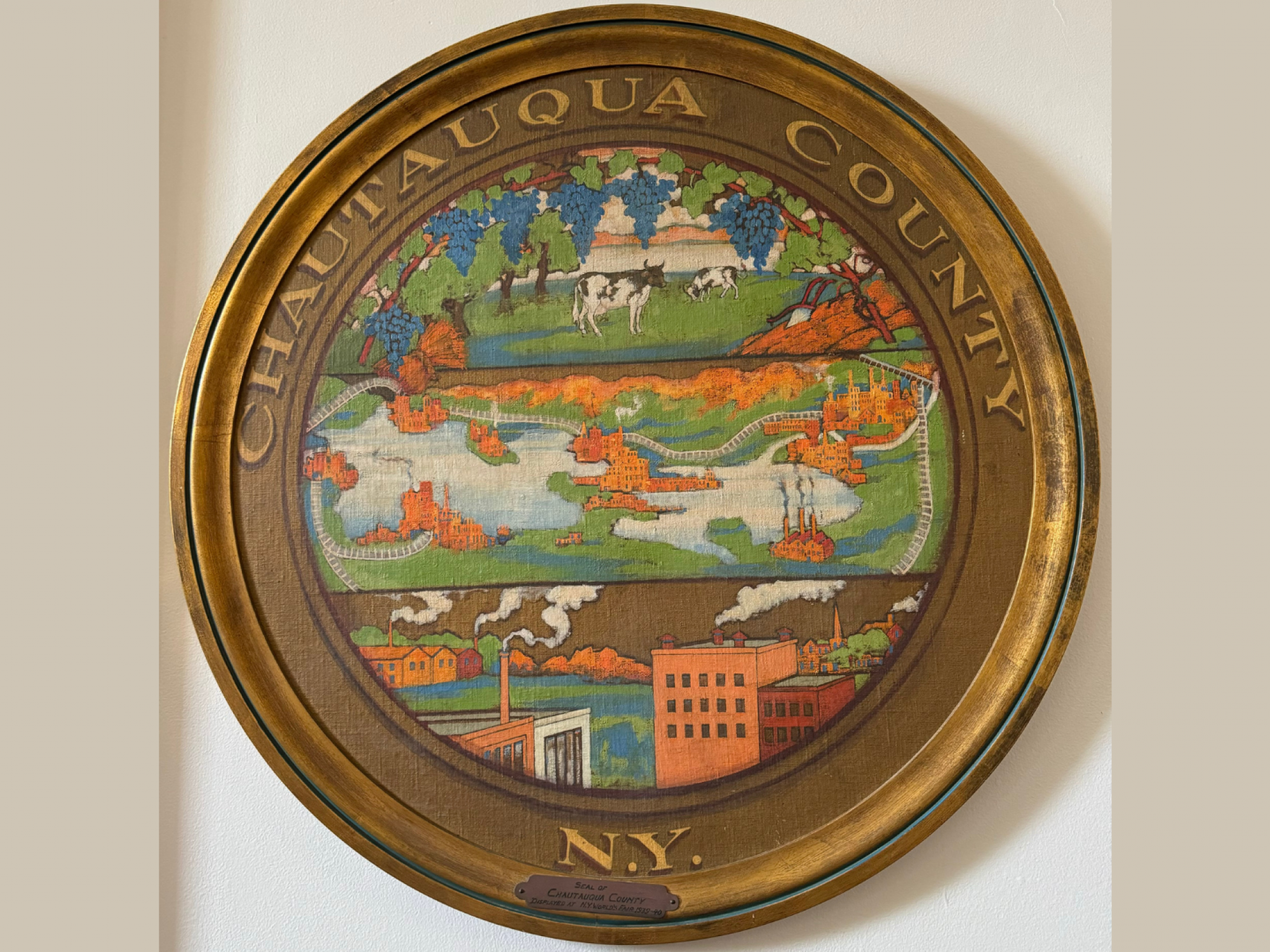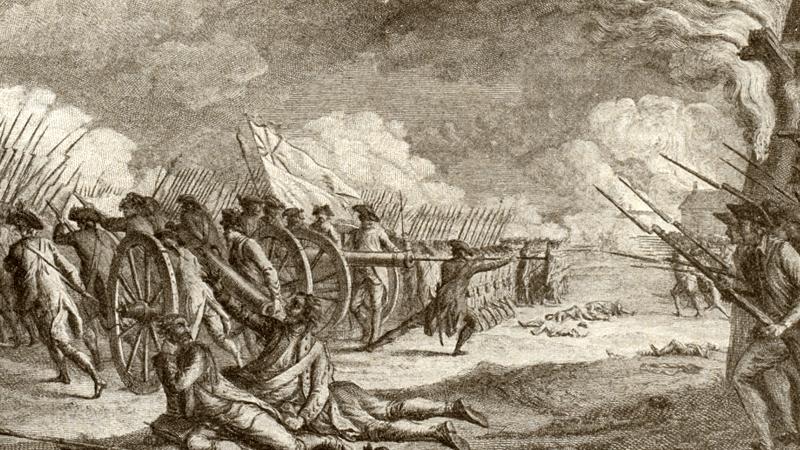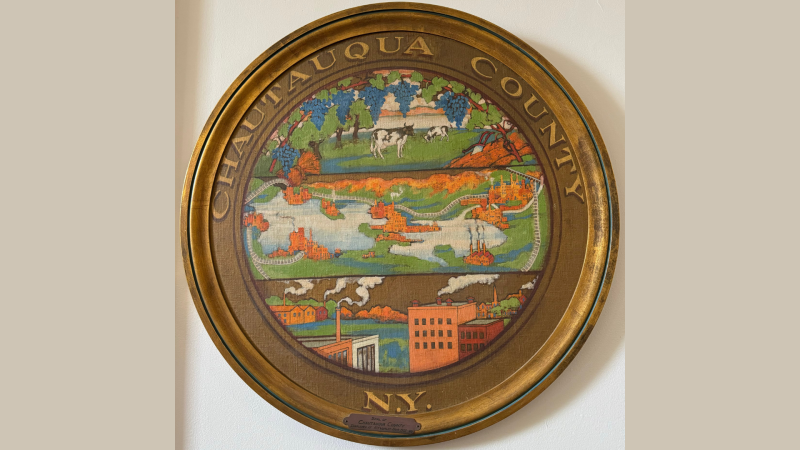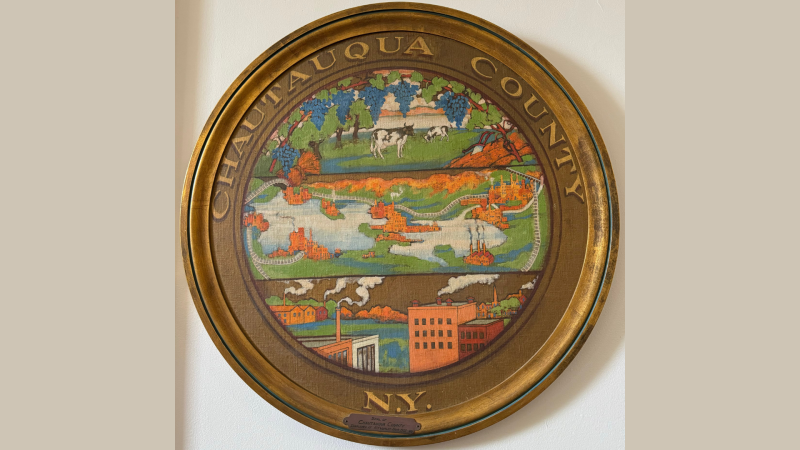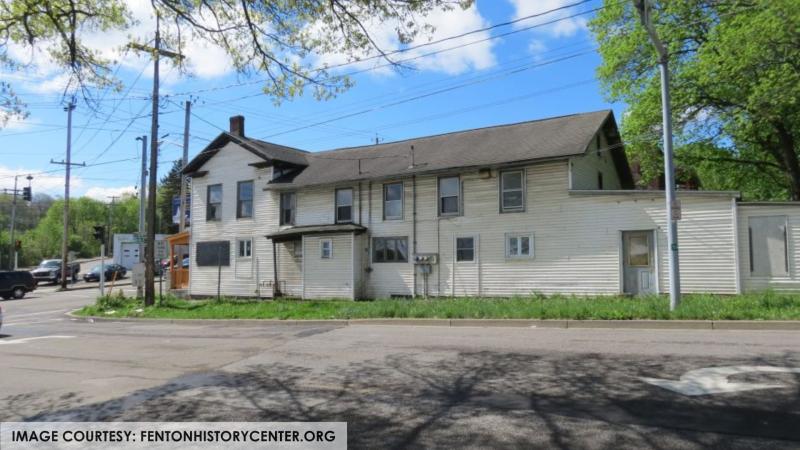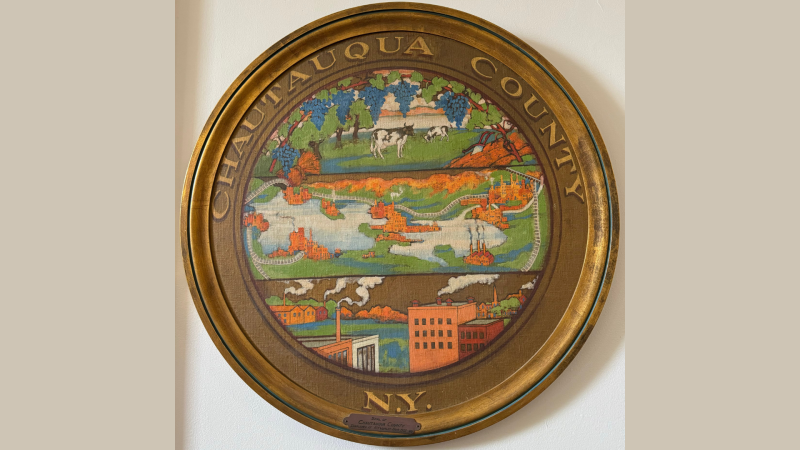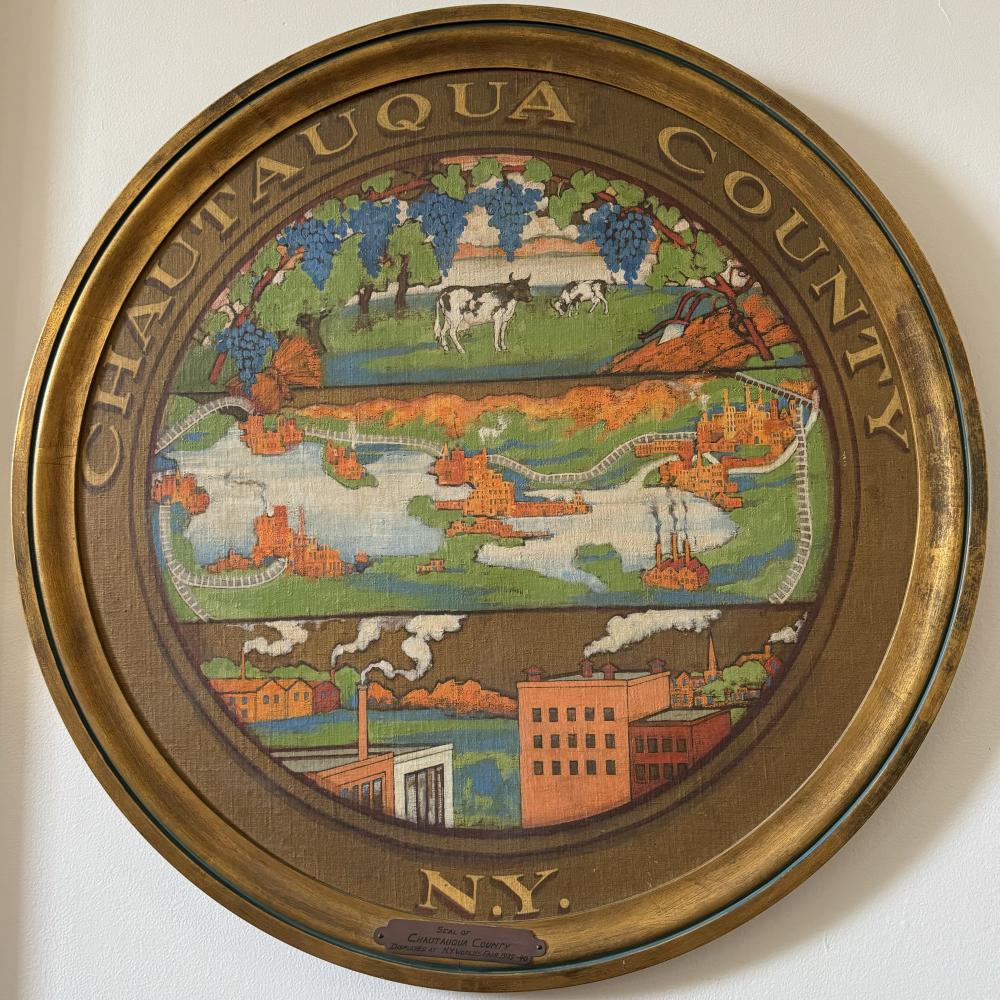
(Seal of Chautauqua County displayed at the New York World's Fair 1939-1940.)
By Norman Carlson, Chautauqua County Historian
The week of August 11th to August 17th in Chautauqua County history brings us a fascinating mix of events ranging from significant educational developments to visits from prominent national figures. Here are some highlights:
August 11:
- 1826: The Stockton Post Office was established, marking a vital step in the communication infrastructure of the area, essential for the growth and development of the community.
- 1857: Mowing machines for hay were in use and for sale in Busti by this date. Alvin Bullock of Busti had patented a mowing machine about 15 years earlier, revolutionizing agricultural practices in the region.
- 1876: Jamestown Lodge No. 34 of the Ancient Order of United Workmen was organized. This fraternal organization provided social and financial support to its members, reflecting the growing sense of community in Jamestown.
- 1893: The Fredonia Union School was organized. Union Schools, formed from a union of Common School districts, were the predecessors to high schools and Central Schools, as defined by the New York State Education Department.
- 1898: Four stores were burglarized in Cherry Creek, an event that likely stirred concern and prompted increased security measures in the small community.
- 1905: Theodore Roosevelt visited the Chautauqua Institution for the fourth and last time. His visits brought national attention to the area and underscored Chautauqua's role as a center for intellectual and cultural exchange.
- 2014: Phil Donahue, a pioneering television talk show host, returned to Chautauqua, engaging audiences with his sharp insights and celebrated career. On the same day, Jay Leno visited Jamestown, adding a touch of Hollywood to the county.
August 12:
- 1925: The Farman Free Library opened in Ellington, providing residents with access to knowledge and learning resources.
- 1929: The Attica earthquake was felt in Chautauqua County, reminding residents of the natural forces at play beneath the Earth’s surface.
- 1940: Regular airmail service was inaugurated in Jamestown, connecting the region more directly to the broader world and speeding up communication.
- 1963: Kinzua Bridge State Park was formed in Pennsylvania, a neighboring site of natural beauty and historical significance that attracted visitors from Chautauqua County and beyond.
August 13:
- 1834: Philip Phillips, known as the "Singing Pilgrim," was born in Cassadaga. Phillips became a world-famous gospel singer and later headed the music department at the Chautauqua Institution.
- 1924: The Sherman Street Grammar School in Jamestown transitioned to become Jefferson Junior High, reflecting the evolving educational needs of the community.
- 1984: After much controversy, wine coolers finally went on sale, marking a shift in local consumer habits and beverage culture.
- 1993: The first Balloon Rally was held at Lakewood, kicking off a new tradition of colorful displays and community gathering.
- 1999: Seatbelts became mandatory on Southwestern Central School buses, significantly enhancing student safety on the roads.
August 14:
- 1822: The Harmony (Ashville) Post Office was established, another key development in the region’s postal network.
- 1858: A contest in Busti between hay mowers invented by Stoddard and Bullock demonstrated local ingenuity and the competitive spirit driving agricultural innovation.
- 1871: A tragedy struck when the steamer Chautauqua exploded at Whitney's Bay on Chautauqua Lake, killing eight people. This event was a somber reminder of the dangers associated with early steam technology.
- 1875: President Ulysses S. Grant visited the Chautauqua Assembly, underscoring the institution's significance as a gathering place for the nation's leaders.
- 1889: Jamestown Business College was incorporated, contributing to the education and professional development of the area's residents.
- 1936: President Franklin D. Roosevelt spoke at Chautauqua, delivering one of his famous speeches and reinforcing the institution’s role in shaping national discourse.
- 1946: The Busti panther scare began, with reports of a large feline roaming the area, causing fear and fascination among locals.
- 1954: WGRZ-TV (Ch. 2) went on the air in Buffalo, expanding the reach of television news and entertainment into Chautauqua County.
- 1993: The first Harmony Historical Festival began in Blockville, celebrating the area's rich heritage with community events and historical exhibits.
- 1996: The statue of Robert H. Jackson was dedicated in Jamestown, honoring the hometown hero who became a Supreme Court Justice and Chief U.S. Prosecutor at the Nuremberg Trials.
- 1997: The Chautauqua County Reptile Society held its first meeting at Bethel Lutheran Church in Falconer, reflecting a unique local interest in reptiles.
- 1999: The first Babe Ruth 12 and Under Softball World Series began in Jamestown, highlighting the area's commitment to youth sports.
- 2002: At 2:30 PM, the new Jamestown ice rink was first put into use, providing a new venue for community recreation and athletic events.
August 15:
- 1779: A skirmish in Warren County, Pennsylvania, marked the nearest Revolutionary War military action to Chautauqua County, linking the area to the broader struggle for American independence.
- 1833: The Ellington Christian Church, also known as the Disciples of Christ, was raised, contributing to the area's spiritual life.
- 1846: A school celebration in Ellery attracted 2,000 attendees, showcasing the accomplishments of students in a festive community gathering.
- 1848: Oren Stoddard of Busti patented his self-protecting bee hive, a significant advancement in beekeeping technology that helped protect hives from moth millers.
- 1877: The white handkerchief salute originated at the Chautauqua Institution, becoming a distinctive tradition still observed today.
- 1889: Land was purchased for the Jamestown Driving Park, which became a popular venue for horse and harness racing, reflecting the community's enthusiasm for sports and recreation.
- 1900: The first Rural Free Delivery (RFD) service from Jamestown was initiated, bringing mail directly to residents' doors and fundamentally changing rural life by reducing the need to travel to post offices.
- 1953: A radar gun was demonstrated in Mayville, representing a significant advancement in law enforcement technology.
August 16:
- 1889: A serious fire in Cherry Creek caused significant damage, illustrating the dangers faced by small towns in the era before modern fire prevention measures.
- 1902: The Hotel De Celoron, which opened on August 7, 1893, tragically burned down, ending an era for a once-grand establishment.
- 1912: William Jennings Bryan made his second and last appearance at Chautauqua, reinforcing the institution’s role as a platform for influential speakers.
- 1955: Experiments with chemical weed control in Chautauqua Lake began, though the exact date is murky. These early efforts highlight the ongoing battle to manage invasive species and protect local waterways.
- 1961: The first annual WCA Country Capers fundraiser was held at Southwestern Central School. For those too young to remember, this event was a major community gathering supporting WCA Hospital in Jamestown.
- 1993: A lap "riot" occurred in Mayville, a curious and somewhat chaotic event that added a touch of unexpected excitement to the summer.
- 2023: Movie theaters at Chautauqua Mall closed, marking the end of an era for local cinema.
August 17:
- 1833: The first visit by a governor of New York, William Marcy, to Jamestown, was a significant event, bringing attention to the region from the state’s highest office.
- 1858: A mowing machine demonstration and contest were held at Abram Frank's farm in Busti, showcasing innovations in agricultural technology.
- 1869: Mrs. Isabella Richmond lectured on "Woman's Sphere" at Jones Hall in Jamestown, offering an anti-suffrage perspective during a time of heated debate over women’s rights.
- 1869: A dramatic near disaster involving burning oil tank cars took place on the Cross Cut Railroad in Brocton, providing a vivid example of the dangers of early industrial transportation.
- 1882: The James M. Brown Post #285 of the Grand Army of the Republic was organized in Jamestown, serving as a veterans' organization for Union soldiers from the Civil War.
- 1909: The first Board of Supervisors meeting was held in the new (and present) County Courthouse, marking the beginning of a new chapter in local governance.
- 1949: In a remarkable engineering feat, two railroad bridges weighing a combined 2,785 tons were moved in just six and a half hours, watched by 3,000 spectators in Warren, Pennsylvania.
These historical events from this week offer a vivid snapshot of the diverse and dynamic history of Chautauqua County, from its agricultural innovations and community developments to the visits of notable national figures and the emergence of local traditions. Each story contributes to the rich heritage that continues to shape the region today.

